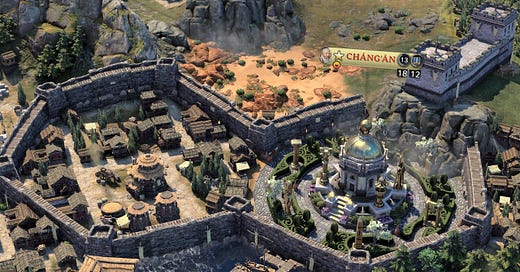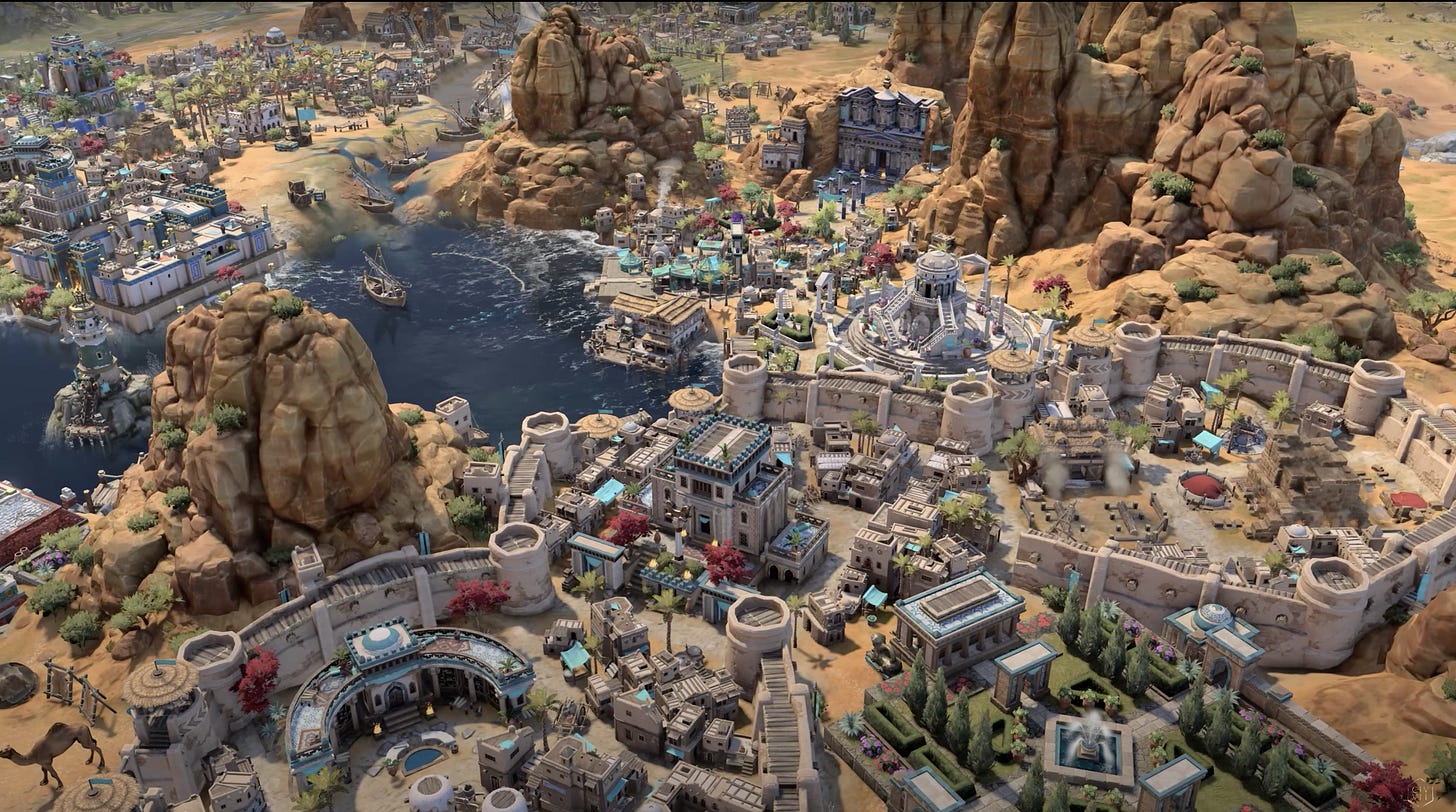At a high level, I think the militaristic gameplay in Civ 7 is a huge improvement from Civ 6. War feels appropriately 'epic', and there is a fair bit of variation in the game that has really led to a lot of fantastic and fun tactical scenarios, especially with the changes to naval units and navigable rivers. But also, I'm writing this after just getting absolutely demolished in the antiquity era, like 'lost my empire of 5 settlements and I only have my capital left' kind of demolished, like 'Mongols conquering China' kind of demolished. And the trauma of it all got me thinking a bit about the current state of military strategy in the game.
Off the top of my head, there are at least five ways to stack combat bonuses on your units available to every civ and leader in the game.
+7 (give or take) from army commander promotions and commendations;
+1 for each iron that you have upgraded (easily +2 total, but I've seen up to +5 if someone is really prioritizing it);
+1 for each city state where you are the suzerain (generally somewhere around +2/+3);
+3 from the tech tree masteries;
+N for your war support (generally +/-2)
Almost all of the unique units get additional combat bonuses. Some of them are pretty wild — the Roman legion gets +2 per tradition (up to +8), while the Carthiginain Numidian Cavalry gets +1 per unique1 resource in the capital (which, as I discovered in my last game, can go as high as +16, and at least one guy on Reddit got it up to +44!!!). Lafayette adds +1 combat bonus for each tradition as well. And there is a special military diplomatic action that lets you get an additional +3.
If someone was single mindedly pursuing war-mongering, they could get somewhere between +14 to +23 combat strength on their units before adding in any unique abilities. This is a lot. In my most recent game, I was facing cavalry units that were a full 25 points stronger than anything I could pump out. This effectively made the 'tactics' of the war irrelevant. I was in a semi-disordered retreat basically from the start of the war, even though I had some very defensible positions.
In some sense, Civ is a strategy game. The point of strategy is to set yourself up well for war, so that when the time comes to fight you have the advantages, you know what your aims are, and you know how to accomplish them. So rewarding players who plan far ahead for war is good. But in another sense, Civ is a board game. And board games can't allow "attackers advantage" to be that strong — it makes it so that the only viable meta is for everyone to stack points as much as possible, and right now the game just isn't set up in a way to make that fun. And the civ unique units are clearly wildly imbalanced. The Mayan Hul'Che doesn't get any combat bonuses, while Carthaginian cav can increase their combat strength by 30-60%. I mentioned before that we should expect to see a lot of balance patches; I suspect this is one of the areas that will eventually be fixed.2
Game design critique aside, if you're playing Civ 7 multiplayer and you want to win, here's my advice.
When attacking:
Get your commander out and up to his first commendation as soon as possible. Go down the assault tree and select the commendation for +5 combat strength in radius.
Save up your diplo points to befriend city states. Try and befriend a military one first so you can take the +1 bonus per suzerain. Conquer as many of the ones that your opponents might try to befriend (this will help with getting that commendation).
Rush the relevant mastery for your unit type.
Settle a bunch of towns to generate lots of gold, and ideally prioritize settling iron or horses.
Cavalry and infantry are very strong. Ranged units so far feel pretty weak. Siege is very useful if your opponent has walls, but you only need like one or two siege units. Build your army composition accordingly.
Navy is a dark horse — if you can get a few boats into the mix through some navigable rivers or through attacking and raiding coastal towns, you can do a lot of damage. But having the situation line up can be a bit RNG.
When defending:
Walls. Your cities and towns should ideally have two or three walls each. Each additional set of walls requires your opponents to bring and sustain approximately 3 more units to the attack — one to deal with holding all of the territory at once, the other two for dealing with the new units you create. Extra walls also force your opponents to buy and transport siege.3
Related: spread walls to fill strategic positions like choke points in mountain ranges. Since walls need to be connected to the city center AND surrounding a district, you again need to plan for this ahead of time. Plan your city accordingly.
Fortify your units early. It takes at least two turns to build fortifications all the way up, start them as soon as possible, ideally before you need it.
Be very careful if your opponent is playing Carthage or Rome. In the former case, keep a close eye on their gold generation and their trade routes, and go to war very early if you have to so that they never build up too many resources. In the latter, you're kinda fucked. Just stay on their good side.
Try to avoid being in a state where you need to defend. In Civ 6, defending was clearly stronger than attacking; in Civ 7, I think attacking is very strong right now. And more generally, I think the game seems to really reward expansionist playstyles. Towns carry over to the next era, which means you start with more population and yields the more towns you have. And while there are definitely some bad happiness outcomes, especially during crises, it tends to be somewhat easy to get enough happiness to sustain large empires. So you want to be conquering if you can.
One quick side note. Because I got absolutely destroyed in antiquity, I figured it would be a good opportunity to go for the military dark age legacy4 in the exploration era. For those who aren't familiar, this legacy gives you three army commanders each with 3 cavalary and 1 siege unit, but you have to give up all settlements besides your capital as well as any other armies. Since I had only my capital left anyway, I figured I'd try this out.
I was not impressed.
First, you lose any commanders you had in the antiquity era. It's generally pretty easy to get a commander up to at least level 4 or 5; starting from scratch on that just sucks, even if you do get some new commanders in the process.
Second, you immediately start with a wild gold deficit. I started the exploration era with -45 gold per turn!
Third, presumably you picked this legacy because you are getting pummeled. If your opponent knows what they are doing, they will have built a few more military commanders to make sure any units they were pummeling you with will also get pulled into the next era. So you don't even get a significant military advantage in the short term — your opponent often has all the units they need, and has commanders that retain their promotions.
I love the idea behind this dark age legacy, but as is…needs some tweaks.
At least, it says “unique”. But in the game it is +1 per resource. This is likely a bug.
While I’m on the subject, I would love if the ‘gamefeel’ of clicking on units during war felt a bit better. Right now it feels extremely sluggish, which is devastating when multiplayer war is already a click-fest. I hate when unexpected things happen because the UX feels slow, so would love if this could also get fixed.
Siege was much weaker in civ 6 because moving it around was very hard and it took a full turn before it could even attack. In civ 7, moving siege is easy because your commanders can just zip catapults across the map. I'm unsure as of yet if that's a good change or bad, but I think it makes the attacker's hand even stronger.
I was also surprised to find that losing cities would actually revert your progress on the legacy tracks. I went from a near expansionist golden age to nada. I’m neutral so far about how I feel about this, but I’ll add that it’s yet another reason why expansionist / aggressive gameplay seems strong so far.





